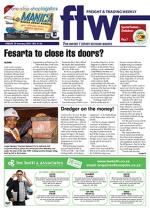A flower seller’s stall
in the Avondale
suburb of Harare
captures the
Zimbabwean economy in a
basket.
The brightly coloured,
high-quality flowers are
freshly picked on local
farms – in a country where
commercial farming has all
but collapsed.
There is a market. The
flower sellers assured FTW
that all the arrangements
would be sold by evening,
despite competition from
other flower sellers in the
suburb and elsewhere in
the city – this in a country
with an estimated 80%
unemployment.
It is estimated that there
are 500 000 people in formal
employment – half of whom
work for government.
The economy survives
because of the tenacity and
inventiveness of flower sellers
such as those on the side of
the road in Avondale.
They source the flowers,
baskets and filler material
themselves, and then craft the
arrangements on site.
There is plenty of passing
traffic. The volume of vehicles
on the road is growing
noticeably. All are imported –
in a country where there is a
shortage of foreign exchange.
According to official
statistics published by
Zimstat, the country imported
passenger vehicles worth
between US$14 400 and
US$20 600 a month in the
first eight months of 2014.
An imported used 1997
Toyota RAV4 sells for as little
as US$2 250, and a 1999
Corolla for US$1 790.
Prices at one dealer go up
to US$12 000 for a RAV4,
and US$4 300 for a Corolla
– in a country where banks
are failing due to lack of
liquidity.
Around 20 banking
institutions have closed since
2000, many taking their
customers’ deposits with
them.
Business has adapted by
paying creditors as soon as
a debtor makes a deposit,
banking offshore or working
with cash.
The cash-based economy
goes largely unrecorded,
and revenues collected by
government continue to
decline.
VAT collections in 2014
were about 7% below budget,
according to the Ministry of
Finance.
Prospects for recovery are
not particularly hopeful,
according to researchers
Mary Manneko Monyau
and Amarakoon Bandara of
African Economic Outlook.
In their 2014 review they
write: “Zimbabwe’s economy
remains in a fragile state,
with an unsustainably high
external debt and massive
deindustrialisation and
informalisation.
“The average GDP growth
rate of 7.5% during the
economic rebound of 2009-
12 is moderating.
“This economic slowdown
is due to liquidity challenges
(eg, the lack of and high
cost of capital and revenue
underperformance),
outdated
technologies,
structural
bottlenecks
that include
power shortages and
infrastructure deficits,
corruption and a volatile
and fragile global financial
environment.”
And yet entrepreneurs
are still selling flowers
and exclusive boutiques in
Harare’s up-market Sam
Levy Village keep their doors
open.
There are also South
African brands – among
them Food Lovers Market
– whose
shelves are
packed
with fresh
produce.
And
imports of
fast-moving
consumer
goods remain
strong – in a
country with
an estimated
250 000
“extremely
poor” households according
to government estimates.
Digging a little below
the surface one finds some
answers.
Freight keeps flowing
because much of the
economy has gone
underground.
Cash cannot be tracked,
and it is safer having dollars
under a mattress than in
some banks.
The Zimbabweans have
also become past masters at
barter.
Then, of course, there is
smuggling.
Porous borders make
it easy to move highvalue
items such as gold,
diamonds and cigarettes.
A direct impact on the
freight industry has been
delays and
additional
costs at the
Beitbridge
border post.
ZIMRA
has installed
two Chinesemanufactured
scanners which
can process up
to 20 vehicles an hour.
Once on the road truckers
have to deal with more
than 15 roadblocks between
Bulawayo and the Beitbridge
border, according to The
Herald newspaper.
Despite all these
challenges, the freight and
trading industries continue
to operate – and in some
cases grow.
Zimbabwe is home to some
of the most sophisticated
and modern logistics and
trucking operations ever
visited by FTW.
There are opportunities
– but it is definitely not a
market for sissies.
INSERT
Around 20 banking
institutions have
closed since 2000,
many taking their
customers’ deposits
with them.
CAPTION 1
Despite the country’s economic woes, exclusive boutiques in Harare’s
up-market Sam Levy Village keep their doors open.
CAPTION 2
A flower seller with high-quality flowers freshly picked
on local farms – in a country where commercial
farming has all but collapsed.

